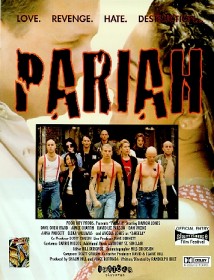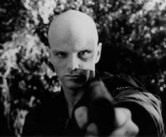|
Pariah
|
| |
 |
USA, 1999. Not Rated. 105
minutes.
Cast: Damon Jones, Dave Oren Ward,
Aimee Chaffin, David Lee Wilson, Dan Weene, Anna Padgett, Elexa Williams,
Angela Jones, Ann Zupa, Brandon Slater, Jason Posey, Chris Jarecki, Terence
Washington
Writer: Randolph Kret
Music: Scott Grusin, additional music by Anthony St. Sinclair
Cinematographer: Nils Erickson
Producers: Shaun Hill, Vince Rotunda
Director: Randolph Kret
|
| Grade: C+ |
Review by
Carlo |
 omewhere
out there are follicle-impaired white supremacists with swastika tattoos and
ear-marked copies of Mein Kampf. Though many of us have never met one,
the idea of an American Nazi evokes a vague image of hardcore hate bands with
shaved heads and heavily-fortified quasi-military compounds in Idaho. According
to the movies, however, these skinheads are everywhere. In 1998, American
History X chronicled one former skinhead's reformation and efforts to
prevent his brother from making the same mistakes. Though a stirring, provocative
tragedy, it did struggle with believability. Without Edward Norton's tour-de-force
as über-skinhead Derek Vinyard anchoring the film, the improbability of the
some of the events and character development would have torpedoed the film's
effectiveness.
omewhere
out there are follicle-impaired white supremacists with swastika tattoos and
ear-marked copies of Mein Kampf. Though many of us have never met one,
the idea of an American Nazi evokes a vague image of hardcore hate bands with
shaved heads and heavily-fortified quasi-military compounds in Idaho. According
to the movies, however, these skinheads are everywhere. In 1998, American
History X chronicled one former skinhead's reformation and efforts to
prevent his brother from making the same mistakes. Though a stirring, provocative
tragedy, it did struggle with believability. Without Edward Norton's tour-de-force
as über-skinhead Derek Vinyard anchoring the film, the improbability of the
some of the events and character development would have torpedoed the film's
effectiveness.
American History X sacrificed realism for the sake of story-telling.
In contrast, tiny Indican Pictures' minuscule-budgeted Pariah (whose
wider release after a limited run in 1999 was delayed due to the Columbine incident)
refuses to make that sacrifice. Unrelentingly, unremittingly violent, Pariah
is a hyper-realistic, hard-boiled depiction of rape, murder, and vengeance among
a group of young Los Angeles white supremacists. They include ex-con Crew (David
Owen Ward), his girlfriend Sissy (Aimee Chaffin), part-time hustler David Lee
(David Lee Wilson), junkie Angela (Angela Jones, Bruce Willis' cab driver in
Pulp Fiction), heavyset Babe (Ann Zupa), and mentally handicapped Doughboy
(Brandon Slater).
During an overly-long twenty minutes of exposition, Pariah establishes
the following facts:
• The skinheads are a gang of dangerously violent drunks.
• They are impressively, superlatively stupid.
• Their parents didn't love them enough.
• They make odd fashion choices involving red suspenders.
The gang despises all non-Whites, Jews, immigrants, and homosexuals, but most
of all, they despise themselves. It's an old story: they inflict violence on
others to validate their own lives. Their self-hatred is further exemplified
by Sissy's willingness to stay with an abusive boyfriend, Angela's casual use
of her own body as a barterable commodity, Babe's desperate neediness, and David
Lee's own gay tendencies. (Wouldn't it be comforting if we could believe that
all homophobes were closet homosexuals? In the movies they invariably are.)
Pariah also introduces us to a young interracial couple, doughy Steve
(Damon Jones) and pretty Sam (Elexa Williams). Their sappy interactions are
the worst scenes in Pariah; Steve is the sort of guy who, moments after
parting with his girlfriend at the end of a romantic evening, will stop her
to say "I love you" one more time. It's obvious where Pariah is headed
with this, but the severity and excruciatingly graphic detail of the skinheads'
assault is a shock. Spliced into the scene are even more graphic shots of Crew
and Sissy having sex, an effective device that underscores the violent, brutal
nature of all the skinheads' interpersonal relationships.
Steve swears to take revenge. He knows exactly who the skinheads are, because,
in an example of their extreme idiocy, they use each other's real names during
the attack and neglect to wear masks. Several months later, Steve is unrecognizable.
Planning to infiltrate the gang, he has shaved his head and accumulated assorted
Nazi paraphernalia, including the requisite suspenders. The gang, suspicious
of strangers, does not extend a welcoming hand, but man-starved Babe ("Babe,
you know, like the movie?") gives Steve an opportunity. Over the next hour,
Pariah documents the gang's escalating violence and the compromises Steve
makes to avoid blowing his cover. Curiously, there are no law enforcement officers
to be found during any of this. 
Though not all that transpires is entirely plausible (a slipshod scene in which
several former victims gang up on the skinheads is a gratuitous indulgence and
quite improbable), Pariah's finest asset is its steadfast realism. It
helps that small budgets and low production values always seem to connote authenticity,
but the credit must go to the performers. All of them look and sound so much
like real people that you won't believe there's an actor among them. Wilson,
having honed his skill in playing rapists in Leaving Las Vegas, brings
a psychotic intensity to the role of David Lee, who is so hateful that even
the other skinheads don't like him. David Owen Ward, who, in a tragic road rage
incident eerily reminiscent of Pariah, died of multiple stab wounds in
April 1999, is frighteningly effective as Crew, the most charismatic–sort of–member
of the gang, and thus its informal leader. The supporting players are all solid.
If there is a weak link, it's Jones, who is merely functional, but he's sufficient,
as his is not a flashy role.
The real standout is Aimee Chaffin. Of all the characters, Sissy is the most
convincingly real, partly because Chaffin is the most genuine, natural actor
in the cast. Writer/director Randolph Kret intends the audience to sympathize
with Steve, but his extreme actions make it difficult to commiserate with him
through the whole movie. Fortunately, Chaffin slowly turns Sissy into a more
sympathetic figure so that by the end, you care as much about what happens to
Sissy as what happens to Steve.
Despite his obvious agenda, Kret (who based the story on an incident from the
life of a friend) allows the camera to observe the story with dispassion. One
of the best scenes is a conversation between Sissy and Lex (Anna Padgett) after
Crew forces himself on Sissy for sex. Troubled, Sissy inquires if Lex has ever
been raped. "You mean by a stranger?" asks Lex, then mentions that her father
has fondled her and all of her sisters. "That's nothing," says Sissy, "My dad
was fucking me when I was twelve." Their conclusion is that neither of them
has ever been raped. The scene is a touch over-written, but the actors' casual
nonchalance and Kret's under-direction makes it real.
Unfortunately, "over-written" also characterizes Pariah as a whole.
There is so much profanity, hatred, and violence, that there is absolutely no
possibility that you can misinterpret Kret's message: racism is ugly and destructive.
Not a difficult point to grasp, but just to drive the concept home, Kret helpfully
provides a quote from Martin Luther King at the beginning of the movie and closes
with a disclaimer stating that nobody involved in the making of the film supports
the views depicted therein. Thanks for clearing that up.
Kret remains more interested in his message than his story. Sometimes scenes
are so jumbled that you have trouble tracking characters and events, and as
things spin further out of control, Kret nearly loses the narrative thread on
several occasions. Instead of building to a powerful climax, Pariah disintegrates
into a confused, violent muddle. Watching this viscerally ferocious film is
like stepping into a boxing ring with the skinheads it portrays. Pariah
jabs and jabs, pummels you against the ropes, then rears up to deliver the knockout
punch. But though you're standing in the ring wobbly-kneed, helpless, and confused–an
easy target–Pariah's coup de grace never quite connects.
Perhaps the lack of closure is part of Kret's point. Perhaps, in a kind of
rebuttal to American History X, Kret intentionally doesn't give you much
to take away from Pariah other than unbridled repugnance. There are no
compelling stories with satisfying endings to be found among these youths–just
hatred, turmoil and pointlessness. The vast majority of us–hopefully–does not
need to be told that racist skinheads are despicable, which begs the question
of why anyone really needs to subject themselves to Pariah. Those who
can stomach the violence will find reasons. Though Kret does a poor job of telling
it, there is a story struggling to be heard amid the chaos–the story of the
Steve's corruption and Sissy's deliverance.
Review
© February 2000 by AboutFilm.Com and the author.
Images © 1999,
courtesy of Indican Pictures. All Rights Reserved.


